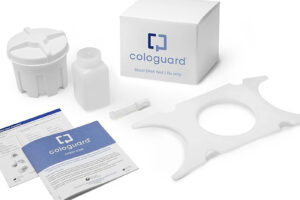When they cut out my cancer, it left a hole in my abdomen the size of my left kidney, which had to be sacrificed along with it. Sometimes I wonder what filled that hole. I imagine an abyss of floating, swirling, sparkling matter. Sometimes at night, I lie in the fetal position, my right arm wrapped around my left side, holding myself together, keeping the sparkles from seeping out of the scar that runs across my stomach.
I was diagnosed with stage IV neuroblastoma when I was seven. Surgery removed my left kidney and the tumor that made a home there. Several rounds of chemotherapy, radiation and stem cell transplants later, I somehow came out the other side.
Over the years, my doctors mentioned — sometimes tenderly, but often not so tenderly — that I could go through menopause early because of my cancer treatment. By the time I was old enough to understand what that meant, it had become an afterthought.
I played my way through my twenties and early thirties, gallivanting around mountain ranges and eventually marrying my husband, Kale, and buying a house in Montana. In July of 2021, while training for a trail race in the 90-degree heat of an abnormally scorching summer, I failed to make the connection between that afterthought and my body’s sudden fatigue, bouts of high anxiety, and inability to regulate temperature. I was only 32 years old.
Shortly after that, my period disappeared and was replaced with hot flashes, an erratic sleep cycle and overwhelming stress. Kale and I had just started attempting to conceive; after two months with no period and a handful of negative pregnancy tests, I went to my doctor. Her initial reaction was to tell me it is normal for active women to lose their periods, and I had nothing to worry about. I asked her to do blood work anyway.
The moment the phone rang a few weeks later, I knew something was wrong. My doctor was on the other end of the line; not her nurse.
My doctor apologized for not taking my concerns seriously, and explained that my egg count was “undetectable,” referencing premature ovarian insufficiency (POI) — a loss of normal function of the ovaries before age 40. She didn’t say that I wouldn’t be able to have a baby, but I heard it in the words unspoken.
Before hanging up, she asked if I was okay. I told her I was fine, and then I hung up the phone and melted into the ground. I called my mom. I called my husband. I called a friend who dropped everything to come over and peel me off my kitchen floor. And then I went back to work.
For weeks, giggling mini-Kales roamed our house like ghosts, and I grieved. Even today, the grief comes in waves. Sitting on the couch in our living room, I watch my husband play with our dog, Zoey, and I can picture it so easily — a little boy or girl, all the best parts of Kale passed on to an equally goofy, athletic, kind, tiny human. Kale’s humility means he has no idea how lucky a child would be to have him as a dad; how well fatherhood would suit him. Kale will pull me onto his lap and talk about all the amazing things we will do with our lives together, and all I can do is sob — a mixture of loss and a little relief. Relief that I don’t have to give my entire heart, my entire life, to another human.That I won’t have to fear experiencing what my parents did when they were told their seven-year-old child had cancer.
I had to wait two months to see the reproductive endocrinologist. During that time, everything seemed to change. No matter how I wore myself out, I’d find myself wide awake at three in the morning, drenched in sweat, with feelings of creepy-crawly bugs shimmying up my legs. While I tried to process my emotions, my body acted out in a myriad of subtle and not-so subtle ways. I was like the Tin Man — my joints needed to be oiled. Symptoms piled on top of each other until the stress was unbearable; my eyelids twitched uncontrollably for weeks.
A quick internet search would have told me what came next. Perhaps I should have seen it coming, but the news shocked me. When I finally saw the specialist, she told me POI is a fancy way to say I’m going through menopause early — most certainly because of my childhood cancer treatment.
She prescribed hormone replacement therapy (HRT) in the form of estrogen and progesterone to protect my bones and heart, and scheduled me for blood work, an internal pelvic exam and a DEXA scan. Then she sent me on my way, as though she’d just prescribed over-the-counter allergy medicine.
I made it out of the office, past the lines of about-to-burst pregnant women in the waiting room, and into the parking lot before I broke down in sobs.
Then the test results started coming back, and I began to crumble. With every call from a nurse, I felt a part of me disappear. My body was deteriorating. My health was slipping away from me with terrifying speed.
Psychologically, it all did a number on me. I spent the next few months deep in research, learning everything I could about POI and menopause. After several months of adjusting to HRT and experimenting with lifestyle changes, I finally started to feel like myself again. I still push my body hard, but I am also more gentle with it. I prioritize rest, eat more food and lift weights to keep my bones strong. I cry when I need to cry, scream from the tops of mountains, full-belly laugh as often as I can, and try to be present for all of it.
Statistically, one in 100 women will experience POI. Most of them will never know why. At least I know my body made these sacrifices to keep me here.There are still times I erupt in inexplicable anger. It crashes out of me in every direction with no forewarning, sending the dog, cat and husband sprinting to the far corners of the house. There is power in me that I didn’t know existed; a power so strong it could split open the world.
I cry when I need to cry, scream from the tops of mountains, full-belly laugh as often as I can, and try to be present for all of it.
Several times I’ve put the remote control away in the freezer, forgotten the name of a best friend, and fed the obliging dog breakfast twice in one morning.
Though most of what I read on the internet implies I should have lost my libido, that my bones should be crumbling and my muscles shrinking, my hunger for pleasure exceeds that of my teenage self, and I’ve never been stronger than I am right now. I tell myself, Don’t put yourself in a box.
The last year has been filled with countless hours of research and biohacking my body, thousands of dollars trying to find the right doctors who will support me, and overhauling everything I thought I knew about how I exercise, sleep and process my own feelings.
People close to me tactfully ask if I’m doing okay. Some don’t ask at all. I answer that I’m “fine,” “good,” even “great.” It’s not a lie, but it’s a half-truth. I’m learning that I can be overflowing with joy and life while simultaneously overcome with grief; that I can be more than one thing at one time.
I wish people would stop asking me about babies. Like they are the only thing I have to give the world; the only thing this world has to give me. And though I want to curse my body for what feels like an unfair twist, it still carries me, in heaviness and light. It has given me a life of pleasure and held so much pain. It’s covered in more scars and bruises than I can count. It has never been perfect, and I’ve never asked it to be.
So I will not hide it, or tell it it’s no longer beautiful or worthy of pleasure or capable of doing hard things. I will not abandon it now.







